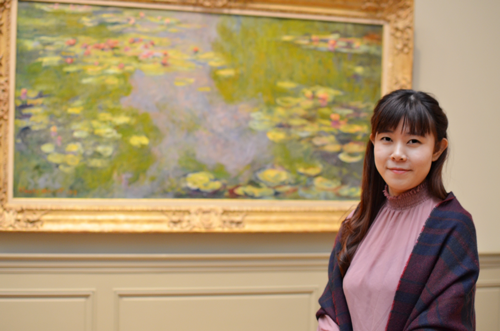Mengjie Qi
 Mengjie (Maggie) Qi is a composer and sound artist. Her works have been performed widely at international festivals, including ICMC (Amsterdam, Shanghai), Audio Arts Festival (Krakow), WOCMAT in Taiwan, CIME General Assembly concerts (North Texas, Moscow), International Electronic Music Festival of New York, Summer Institute for Contemporary Performance Practice at New England Conservatory, and MUSICACOUSTICA-BEIJING. Maggie’s works have won awards on noted competitions, such as first prize on MUSICACOUSTICA electronic music composition contest (2011, 2012, 2014), and third prize on the Competition of Oskar Kolberg (2014). She has been commissioned by MUSICACOUSTICA-BEIJING and she is the Composer in Residence of Love for Music Ensemble in Beijing. Maggie Qi is doctoral candidate at Central Conservatory of Music under the guidance of Professor Zhang Xiaofu. She is currently visiting scholar at CUNY- Brooklyn College under the supervision of Professor Douglas Geers. Her doctoral dissertation is on interactive sound installation.
Mengjie (Maggie) Qi is a composer and sound artist. Her works have been performed widely at international festivals, including ICMC (Amsterdam, Shanghai), Audio Arts Festival (Krakow), WOCMAT in Taiwan, CIME General Assembly concerts (North Texas, Moscow), International Electronic Music Festival of New York, Summer Institute for Contemporary Performance Practice at New England Conservatory, and MUSICACOUSTICA-BEIJING. Maggie’s works have won awards on noted competitions, such as first prize on MUSICACOUSTICA electronic music composition contest (2011, 2012, 2014), and third prize on the Competition of Oskar Kolberg (2014). She has been commissioned by MUSICACOUSTICA-BEIJING and she is the Composer in Residence of Love for Music Ensemble in Beijing. Maggie Qi is doctoral candidate at Central Conservatory of Music under the guidance of Professor Zhang Xiaofu. She is currently visiting scholar at CUNY- Brooklyn College under the supervision of Professor Douglas Geers. Her doctoral dissertation is on interactive sound installation.
Maggie received her master degree in 2015 at the Central Conservatory of Music while studying electroacoustic music composition with Professor Ping Jin. She received her Bachelor degree in recording and sound design at the National Academy of Chinese Theater Art in 2012.
Lin Chong Fled at Night
This story was originated from Water Margin, one of the most famous Chinese classical novels.It depicts the experience when Lin Chong got persecuted from Gao Qiu then to seek shelter in Liangshan County. In the original Peking Opera, the singer himself presented the whole experience and psychological changes with the arias and performance.The composer disorganized the order of the original arias but still based on the melodic lines, and deconstructed the arias into spot-like and line sound objects, then reintegrated with percussion voices into a new entirety. There are two sections in this composition, the first one is finding the escaping way at night, lodging in an old temple. The mysterious night and the sadness were depicted with metallic percussions in this section. The second section is the monologue of the figure expressed by the arias and spoken parts, to convey the anger and the conviction belief of Lin Chong. By means of the granular synthesis technics, the line-like sounds are converted into spot-like sounds, and they stand out even more in the late night environment, the dramatic intension of the original arias are strengthened after the electronic transformation. After all, this whole piece created a perfect integration of modern electronic technologies and the classic Peking Opera.
Songs in the Valley
In the remote area of South China, people live in small villages surrounded by mountains, they always sing in a very free way to communicate with people
from far away. They also tend to sing as a way to express their inner feelings. The vocal sounds echoes back and forth in the valley where the mountains are at
different heights, Songs in the Valley was inspired by the way of people singing, and the composer aimed to create an immersive soundscape of that space.
